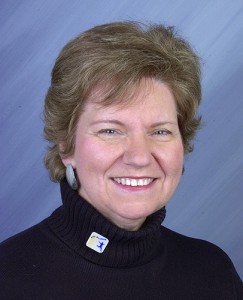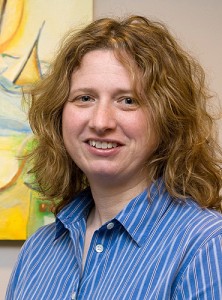
Two collaborators from UConn’s Center for Health, Intervention and Prevention (CHIP) are bringing parents and pediatricians together to target obesity in Hartford children as young as age 2.
With a new grant from the Aetna Foundation to Connecticut Children’s Medical Center, Dr. Michelle Cloutier, a professor of pediatrics at the UConn Health Center and a CHIP affiliate, and Amy Gorin, an assistant professor of psychology and a CHIP principal investigator, will develop and test an intervention to address obesity in African American and Latino children between the ages of 2 and 4.
“In general, rates of obesity are higher in underserved populations,” says Cloutier, the grant’s principal investigator. “In Hartford, 40 percent of African American and Latino children are obese or at risk for obesity by the time they start school at age 5.”
Cloutier and Gorin will assess how parents in the target population view their children’s diet, activity level, and weight, and will work with pediatricians to deliver meaningful messages to parents about those topics. The messages will be linked to intervention strategies that families have stated they can implement at home.
The researchers will train participating healthcare providers in a technique known as “brief motivational counseling,” so they can effectively and efficiently reinforce the identified messages and intervention strategies at every check-up during the course of the study.
“A physician can say, ‘Eat less and exercise more,’ but that doesn’t help a family learn the specific things it needs to do differently,” said Cloutier, an expert in medical messaging. “This intervention will provide messages that can be tailored and customized for each family and that can be delivered consistently at every medical visit in three minutes or less.”

Cloutier and Gorin’s preliminary work on this project included developing a 21-question survey, called Growing Up Healthy, and conducting the survey with parents of children seen at two Hartford clinics affiliated with Connecticut Children’s. Parents were invited to complete the survey if they had a child with a Body Mass Index (BMI) at or above the 85th percentile.
The U.S. Centers for Disease Control and Prevention (CDC) considers a child overweight if his or her BMI falls between the 85th and 95th percentile. A child is considered obese if his or her BMI falls above the 95th percentile.
Through their survey, Cloutier and Gorin identified several behaviors linked with children being overweight or obese. These included the amount of juice consumed, the type and amount of milk consumed, and the amount of television viewed daily. These behaviors will be the focus of the intervention they are developing.
“The strength of this intervention is its simplicity,” Cloutier said. “Small changes in these three areas over the course of a year could make a huge difference.”
The researchers plan to recruit up to 40 pediatricians and 250 children to participate in the study. They anticipate each child will see a healthcare provider at one of the two Hartford-based clinics three to five times during the course of the study, which will last one year.
They will compare the BMI of each child at the beginning of the year with his or her BMI at the end of the year to determine the intervention’s effectiveness. They also will evaluate whether it is efficient for pediatricians to deliver the brief obesity intervention at every visit, given the time constraints they face.
Cloutier, who also directs the Asthma Center at Connecticut Children’s, is optimistic, based on the results she had with a disease management program she created for pediatricians and their patients. The award-winning program, Easy Breathing, helped busy physicians identify and treat asthma in their patients.
She believes it is because of the success with Easy Breathing, coupled with the extent of childhood obesity and the concern that pediatricians have in this area, that Hartford’s pediatric community has been so enthusiastic about Growing Up Healthy to date.
Cloutier and Gorin became collaborators through CHIP, where Gorin coordinates an obesity research interest group that has brought together UConn faculty members from more than half-a-dozen disciplines and multiple campuses with a common interest in obesity and related co-morbidities.
Their pilot work on this project was funded through an award from The Donaghue Foundation and a UConn Research Foundation Faculty Grant.


